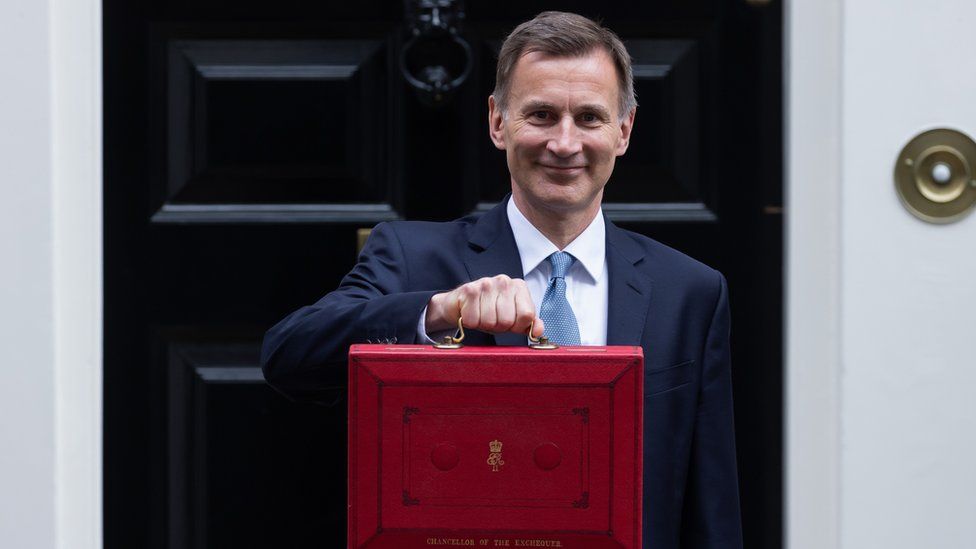33 minutes ago
About sharing
Promises of tax cuts during general election campaigns may have to be rolled back as the UK economy faces some of its worst problems since the 1950s, a new report suggests.
“Tax cuts today add to the risk of tax rises or spending cuts tomorrow,” the IFS said.
The Treasury said growing the economy would “deliver sustainable funding”.
The IFS added Labour and the Tories must be “honest” about a need for more public funding if immigration falls.
The Institute for Fiscal Studies – a leading economic thinktank – called the issue “a fiscal bind”.
“It might be easy to announce immediate tax cuts, without any hint of what it is the state currently does that it will stop doing, or what taxes will rise in future, but this trade-off cannot be wished away”, the IFS’s report said, adding that “it will be more difficult to reduce the debt-to-GDP ratio over the next parliament than in any other parliament since the 1950s”.
It said that as a result, there will be “limited scope to cut taxes or increase spending by a meaningful amount”.
The warning comes after Chancellor Jeremy Hunt insisted he did not make “crowd-pleasing” tax cuts as giveaways ahead of the next general election in his Autumn Statement in November. Mr Hunt also said that countries with lower taxes have more “dynamic, faster growing economies”, giving strong hints that he wants to cut taxes in the spring Budget.
In the Autumn Statement, Mr Hunt announced a £10bn National Insurance cut for millions and an uplift in benefits, claiming the Conservatives have delivered the biggest tax cuts in decades in a move to boost the UK’s stagnant economy and top up incomes.
However, the UK’s overall tax burden is still on course to hit a record high.
Meanwhile, the Labour party’s Sir Keir Starmer has said Labour will want to spend £28bn a year on green energy projects.
But in its report ahead of this year’s general election, the IFS said that in the run-up to the election, parties will have to “be honest” about the “trade-offs” needed for tax cuts or increased spending, especially if they want to lower the national debt, which both major parties said they will prioritise.
The IFS said with weak economic growth and a cost-of-living crisis, prospects for any winning government were “miserable”.
“The challenge is that with higher levels of spending on debt interest and forecasts suggesting that economic growth will continue to be weak, getting debt falling will be much more difficult than in the recent past – and arguably more difficult than at any point in the post-war period”, it said.
The UK is in the midst of a cost-of-living crisis with inflation – the pace at which prices rise – having reached near-record highs of in the past 12 months. In the year to February 2023, inflation rose to 10.4% but has since come down, and in the year to December 2023 (the most recent published figures) was 5.1%.
Economic growth has also been slower, with new challenges on the horizon resulting from attacks by Houthi rebels on ships in one of the world’s busiest trading routes in the Red Sea.
Meanwhile, lowering immigration, which the IFS said both Labour and Conservatives promised, would in fact mean the need for almost unaffordable increased public funding for social care, as the number of foreign care workers became reduced, the thinktank said.
The IFS said both parties were “less keen to talk about” the cost of lowering immigration, such as increased university tuition fees for domestic students as income from foreign students was stifled.
It said the higher education industry is reliant upon such fees, and lowering immigration could lead to either the need for more government subsidy, or lead to major changes in the way universities operate. A spokesperson for the IFS cited the example of the University of York which was reported to have lowered its entry grade requirements for foreign students in the face of “financial challenges”.
The university’s vice-chancellor said that the recruitment of overseas students was vital to help subsidise the costs of educating domestic students, with tuition fees having been frozen by the government for more than a decade.
The Treasury said its action to “halve inflation and ensure debt falls as a share of the economy means we are now beginning to turn a corner, which is why we can afford tax cuts for 27 million working people this month”.
A spokesperson said: “The best way to deliver sustainable funding for public services in the future is to grow the economy – the UK has grown faster than France, Germany and Japan since 2010 and the OBR [Office for Budget Responsibility] say our action in spring and autumn will deliver the largest boost on record”.
The Labour Party has been contacted for comment.
Related Topics
5 days ago
5 January
1 day ago
